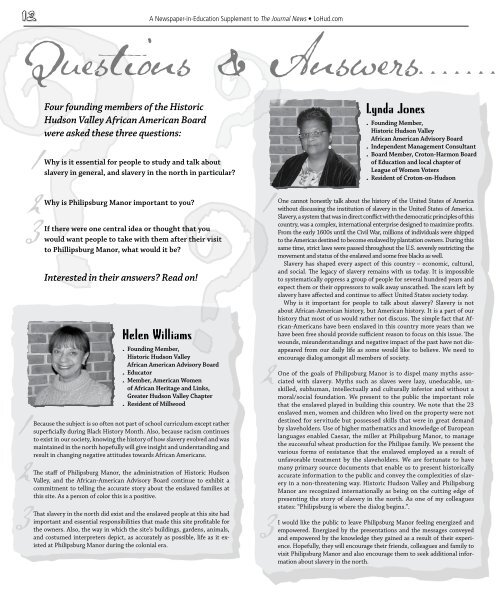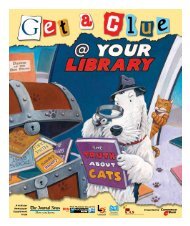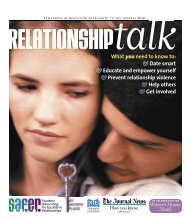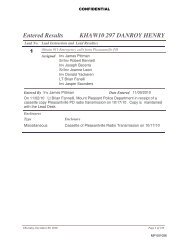Slavery in the Lower Hudson Valley - The Journal News
Slavery in the Lower Hudson Valley - The Journal News
Slavery in the Lower Hudson Valley - The Journal News
You also want an ePaper? Increase the reach of your titles
YUMPU automatically turns print PDFs into web optimized ePapers that Google loves.
Questions & Answers. . . . . . .<br />
12<br />
A <strong>News</strong>paper-<strong>in</strong>-Education Supplement to <strong>The</strong> <strong>Journal</strong> <strong>News</strong> • LoHud.com<br />
1<br />
2<br />
3<br />
Four found<strong>in</strong>g members of <strong>the</strong> Historic<br />
<strong>Hudson</strong> <strong>Valley</strong> African American Board<br />
were asked <strong>the</strong>se three questions:<br />
Why is it essential for people to study and talk about<br />
slavery <strong>in</strong> general, and slavery <strong>in</strong> <strong>the</strong> north <strong>in</strong> particular?<br />
Why is Philipsburg Manor important to you?<br />
If <strong>the</strong>re were one central idea or thought that you<br />
would want people to take with <strong>the</strong>m after <strong>the</strong>ir visit<br />
to Phillipsburg Manor, what would it be?<br />
Interested <strong>in</strong> <strong>the</strong>ir answers? Read on!<br />
Helen Williams<br />
. Found<strong>in</strong>g Member,<br />
Historic <strong>Hudson</strong> <strong>Valley</strong><br />
African American Advisory Board<br />
. Educator<br />
. Member, American Women<br />
of African Heritage and L<strong>in</strong>ks,<br />
Greater <strong>Hudson</strong> <strong>Valley</strong> Chapter<br />
. Resident of Millwood<br />
1Because <strong>the</strong> subject is so often not part of school curriculum except ra<strong>the</strong>r<br />
superficially dur<strong>in</strong>g Black History Month. Also, because racism cont<strong>in</strong>ues<br />
to exist <strong>in</strong> our society, know<strong>in</strong>g <strong>the</strong> history of how slavery evolved and was<br />
ma<strong>in</strong>ta<strong>in</strong>ed <strong>in</strong> <strong>the</strong> north hopefully will give <strong>in</strong>sight and understand<strong>in</strong>g and<br />
result <strong>in</strong> chang<strong>in</strong>g negative attitudes towards African Americans.<br />
<strong>The</strong> staff of Philipsburg Manor, <strong>the</strong> adm<strong>in</strong>istration of Historic <strong>Hudson</strong><br />
<strong>Valley</strong>, and <strong>the</strong> African-American Advisory Board cont<strong>in</strong>ue to exhibit a<br />
commitment to tell<strong>in</strong>g <strong>the</strong> accurate story about <strong>the</strong> enslaved families at<br />
this site. As a person of color this is a positive.<br />
That slavery <strong>in</strong> <strong>the</strong> north did exist and <strong>the</strong> enslaved people at this site had<br />
important and essential responsibilities that made this site profitable for<br />
<strong>the</strong> owners. Also, <strong>the</strong> way <strong>in</strong> which <strong>the</strong> site’s build<strong>in</strong>gs, gardens, animals,<br />
and costumed <strong>in</strong>terpreters depict, as accurately as possible, life as it existed<br />
at Philipsburg Manor dur<strong>in</strong>g <strong>the</strong> colonial era.<br />
1<br />
2 3<br />
2<br />
3<br />
Lynda Jones<br />
. Found<strong>in</strong>g Member,<br />
Historic <strong>Hudson</strong> <strong>Valley</strong><br />
African American Advisory Board<br />
. Independent Management Consultant<br />
. Board Member, Croton-Harmon Board<br />
of Education and local chapter of<br />
League of Women Voters<br />
. Resident of Croton-on-<strong>Hudson</strong><br />
One cannot honestly talk about <strong>the</strong> history of <strong>the</strong> United States of America<br />
without discuss<strong>in</strong>g <strong>the</strong> <strong>in</strong>stitution of slavery <strong>in</strong> <strong>the</strong> United States of America.<br />
<strong>Slavery</strong>, a system that was <strong>in</strong> direct conflict with <strong>the</strong> democratic pr<strong>in</strong>ciples of this<br />
country, was a complex, <strong>in</strong>ternational enterprise designed to maximize profits.<br />
From <strong>the</strong> early 1600s until <strong>the</strong> Civil War, millions of <strong>in</strong>dividuals were shipped<br />
to <strong>the</strong> Americas dest<strong>in</strong>ed to become enslaved by plantation owners. Dur<strong>in</strong>g this<br />
same time, strict laws were passed throughout <strong>the</strong> U.S. severely restrict<strong>in</strong>g <strong>the</strong><br />
movement and status of <strong>the</strong> enslaved and some free blacks as well.<br />
<strong>Slavery</strong> has shaped every aspect of this country – economic, cultural,<br />
and social. <strong>The</strong> legacy of slavery rema<strong>in</strong>s with us today. It is impossible<br />
to systematically oppress a group of people for several hundred years and<br />
expect <strong>the</strong>m or <strong>the</strong>ir oppressors to walk away unsca<strong>the</strong>d. <strong>The</strong> scars left by<br />
slavery have affected and cont<strong>in</strong>ue to affect United States society today.<br />
Why is it important for people to talk about slavery? <strong>Slavery</strong> is not<br />
about African-American history, but American history. It is a part of our<br />
history that most of us would ra<strong>the</strong>r not discuss. <strong>The</strong> simple fact that African-Americans<br />
have been enslaved <strong>in</strong> this country more years than we<br />
have been free should provide sufficient reason to focus on this issue. <strong>The</strong><br />
wounds, misunderstand<strong>in</strong>gs and negative impact of <strong>the</strong> past have not disappeared<br />
from our daily life as some would like to believe. We need to<br />
encourage dialog amongst all members of society.<br />
One of <strong>the</strong> goals of Philipsburg Manor is to dispel many myths associated<br />
with slavery. Myths such as slaves were lazy, uneducable, unskilled,<br />
subhuman, <strong>in</strong>tellectually and culturally <strong>in</strong>ferior and without a<br />
moral/social foundation. We present to <strong>the</strong> public <strong>the</strong> important role<br />
that <strong>the</strong> enslaved played <strong>in</strong> build<strong>in</strong>g this country. We note that <strong>the</strong> 23<br />
enslaved men, women and children who lived on <strong>the</strong> property were not<br />
dest<strong>in</strong>ed for servitude but possessed skills that were <strong>in</strong> great demand<br />
by slaveholders. Use of higher ma<strong>the</strong>matics and knowledge of European<br />
languages enabled Caesar, <strong>the</strong> miller at Philipsburg Manor, to manage<br />
<strong>the</strong> successful wheat production for <strong>the</strong> Philipse family. We present <strong>the</strong><br />
various forms of resistance that <strong>the</strong> enslaved employed as a result of<br />
unfavorable treatment by <strong>the</strong> slaveholders. We are fortunate to have<br />
many primary source documents that enable us to present historically<br />
accurate <strong>in</strong>formation to <strong>the</strong> public and convey <strong>the</strong> complexities of slavery<br />
<strong>in</strong> a non-threaten<strong>in</strong>g way. Historic <strong>Hudson</strong> <strong>Valley</strong> and Philipsburg<br />
Manor are recognized <strong>in</strong>ternationally as be<strong>in</strong>g on <strong>the</strong> cutt<strong>in</strong>g edge of<br />
present<strong>in</strong>g <strong>the</strong> story of slavery <strong>in</strong> <strong>the</strong> north. As one of my colleagues<br />
states: “Philipsburg is where <strong>the</strong> dialog beg<strong>in</strong>s.”.<br />
I would like <strong>the</strong> public to leave Philipsburg Manor feel<strong>in</strong>g energized and<br />
empowered. Energized by <strong>the</strong> presentations and <strong>the</strong> messages conveyed<br />
and empowered by <strong>the</strong> knowledge <strong>the</strong>y ga<strong>in</strong>ed as a result of <strong>the</strong>ir experience.<br />
Hopefully, <strong>the</strong>y will encourage <strong>the</strong>ir friends, colleagues and family to<br />
visit Philipsburg Manor and also encourage <strong>the</strong>m to seek additional <strong>in</strong>formation<br />
about slavery <strong>in</strong> <strong>the</strong> north.






